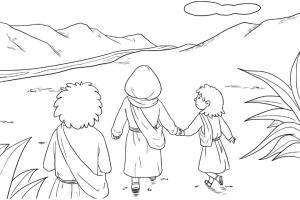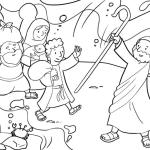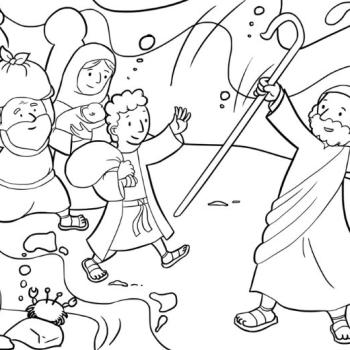
Within the pages of the Bible, we encounter numerous stories that offer profound insights into the complexities of human nature and the unfolding of history. One such story is that of Sarah and Hagar, two women who played significant roles in the historical narrative of motherhood and the births of two nations. As we delve into this tale from the book of Genesis, we uncover the intricate relationships, the conflicts, and the symbolism that lie beneath the surface.
Sarah and Hagar in the Book of Genesis
The story of Sarah and Hagar can be found in the book of Genesis, specifically in chapters 16 and 21. Once central figure in this story was Sarah, the beloved wife of Abraham. In these chapters, we watch as she faces the heart-wrenching reality of her barrenness and deeply yearns for the child who would fulfill God’s promised descendants.
Because of this desperate desire, Sarah made the astonishing decision to offer her maid, Hagar, to Abraham as a substitute wife in an attempt to secure a child. Hagar, a vulnerable and obedient servant, became pregnant, aggravating the already fragile dynamics within the household. Fueled by jealousy and insecurity, Sarah’s treatment of Hagar grew increasingly harsh. It ultimately led to Hagar’s harrowing decision to flee into the wilderness, seeking solace and escape from her oppressive circumstances.
This biblical account serves as a poignant reminder of the power dynamics and intricate relationships that can emerge from unchecked human desires and lack of faith in God. Sarah’s desperation, rooted in her longing for motherhood, clouded her judgment and led her to manipulate the situation. In so doing, she disregarded the consequences that would follow. The resulting tension and animosity between Sarah and Hagar highlight the destructive nature of jealousy and the potential harm it can inflict upon both the instigator and the victim.
Hagar’s courageous decision to flee into the wilderness reflects her resilience and determination to find freedom and refuge from the oppressive environment she found herself trapped in. This ancient story continues to resonate with audiences today, serving as a cautionary tale on the far-reaching implications of impulsive actions and the importance of empathy and understanding in navigating complex relationships.
Abraham’s Role in the Story
Abraham, revered as a patriarch and a symbol of unwavering faith, occupies a significant place in the narrative of Sarah and Hagar. His role as a husband to both women presents a unique and challenging dynamic, highlighting the intricate nature of human relationships. Abraham’s actions throughout the story, driven by his unwavering desire to see God’s promise fulfilled, carry profound implications.
When Sarah, unable to conceive a child, suggested that Abraham take Hagar as a concubine, Abraham faced a difficult choice. On the one hand, he deeply loved Sarah and felt a sense of duty towards her. On the other hand, he recognized the importance of fulfilling God’s promise to be the father of nations. In a decision that belied his profound faith and trust in divine guidance, Abraham acquiesced to Sarah’s proposal. This act of polygamy, while culturally acceptable at the time, introduced a complex dynamic into the household that tested the limits of Abraham’s loyalty and emotional capacity.
The consequences of Abraham’s decision were far-reaching and impactful. Hagar, initially treated with favor and respect, soon faced Sarah’s bitterness and jealousy. As a result, a strained relationship developed between the two women. The birth of Ishmael, Hagar’s son, further complicated matters, as tensions escalated within the household. Abraham, torn between his love for Sarah and his responsibility towards Hagar and Ishmael, found himself navigating a delicate balance, in which he attempted to mitigate the conflicts arising from the unconventional family structure. The story of Abraham, Sarah, and Hagar serves as a cautionary tale that sheds light on the complexities and challenges of managing conflicting loyalties and desires within the context of faith and divine promises.
The Birth of Hagar’s Son, Ishmael
Hagar’s story is a testament to the human capacity for resilience in the face of adversity. Forced to flee from the mistreatment of her mistress, Sarah, she found herself alone and destitute in the harsh wilderness. However, it was in this desolate place that the angel of the Lord appeared to her, bringing a message of hope and promise. The angel, most likely a preincarnate appearance of Jesus, assured Hagar that her son, Ishmael, would also become the father of a great nation.
With the birth of Ishmael, a significant shift occurred in the divine plan. In including Hagar and Ishmael in His plan, God demonstrated His embrace of diversity and His sovereignty over all nations. Ishmael’s descendants would go on to form the Arab nations, a testament to the inclusive nature of God’s plan for humanity. This serves as a powerful reminder that God’s love extends to people of all backgrounds, ethnicities, and nationalities. Hagar’s story, though marked by hardship, ultimately showcases the triumph of faith and the fulfillment of God’s promises.
The Birth of Sarah’s Son, Isaac
Despite the initial obstacles Sarah faced, including her advanced age and her long-standing barrenness, God remained faithful to His promise. In a remarkable display of His divine power, God intervened and miraculously enabled Sarah to conceive and bear a son, Isaac. This long-awaited arrival brought immeasurable joy and renewed hope to both Sarah and her husband, Abraham. It signified the fulfillment of God’s covenant with them.
Isaac’s birth held deep significance beyond the personal joy it brought to Sarah and Abraham. As the long-awaited child, he would become the rightful heir to Abraham’s lineage. As such, he carried the weight of their family’s legacy and the promises God made to them. In this way, Isaac played a crucial role in the continuity of the Hebrew people, ensuring the preservation of their heritage and the fulfillment of God’s greater plan of redemption.
Sarah’s incredible journey from barrenness to motherhood serves as a powerful testament to the unwavering faithfulness of God, demonstrating His ability to bring forth new life even in the most improbable and challenging circumstances. It is an inspiring reminder that God’s promises are not bound by human limitations. He can bring forth blessings beyond what we could even imagine.
Conflict between Sarah and Hagar
The Significance of Sarah and Hagar as Mothers
The significance of Sarah and Hagar as mothers transcends the personal, individual sphere and stretches into the realm of history and heritage. Sarah, as the chosen matriarch of the Hebrew people, carried the weight of a lineage that would lead to the establishment of the Israelite nation. Her son, Isaac, would become the patriarch of the twelve tribes of Israel. Sarah’s motherhood was not only a personal blessing for her. It also laid the foundation for the fulfillment of God’s promise to Abraham (see Genesis 15 and 17) and the shaping of a historical legacy.
Similarly, Hagar’s role as the mother of Ishmael holds profound significance for the Arab nations. Ishmael, as the son of Abraham, became the patriarch of the Arab tribes and played a significant role in their development and expansion. Hagar’s motherhood symbolized the beginning of a lineage that would shape the course of Arab history, culture, and identity. Her son’s descendants would go on to establish powerful empires, contribute to the fields of science, literature, and the arts, and leave an indelible mark on the world. Hagar’s story, as well as Sarah’s, reminds us of the impact motherhood can have, not just in the lives of individuals, but also in the shaping of nations and the collective human experience.
Sarah and Hagar as Representatives of Two Nations
The story of Sarah and Hagar carries profound symbolic weight that resonates throughout history. These two women represent much more than their own personal journeys. They symbolize the birth of two people groups – the Hebrews and the Arab nations. Their interpersonal struggle serves as a prelude to the complex and intricate dynamics that have unfolded between these two nations over the centuries.
The narrative not only highlights the intricate interconnectedness of humanity. It also serves as a powerful reminder of the ever-present need for understanding and empathy in the face of cultural and religious differences. Their story is a testament to the importance of recognizing and embracing diversity, through which bridges can be built between seemingly disparate communities. By delving into the depths of the experiences of these two women, we gain insight into the shared struggles, hopes, and dreams that unite us all as human beings. Ultimately, the tale of Sarah and Hagar invites us to transcend our differences and work towards a world marked by compassion, unity, and harmony.
Lessons Learned from the Story of Sarah and Hagar
The story of Sarah and Hagar holds enduring relevance and offers insights into human nature and relationships. By delving deeper into this narrative, we can uncover valuable lessons that can shape our own lives and interactions within contemporary society.
One crucial lesson is the importance of patience and trusting in God’s timing. Sarah’s impulsive decision resulted in conflict and pain for all involved. This shows us the consequences of acting hastily and reminds us to have faith in God’s plan, even when it seems slow or uncertain. In a world that values instant gratification and quick solutions, this story reminds us of the importance of practicing patience and surrendering control to a higher power.
Another significant lesson we can draw from the story of Sarah and Hagar is the destructive nature of jealousy and the power of compassion and empathy in our relationships. Sarah’s treatment of Hagar and her child serves as a stark reminder of the harmful effects of envy and the need to treat others with kindness. In a society where competition often dominates, the story of Sarah and Hagar calls us to recognize that comparison kills, but that love and accepting everyone for who they are heals. It invites us to move beyond our own limited perspectives and to actively seek understanding and unity in the midst of differences.
This story offers timeless wisdom and pertinent lessons for us today. By reflecting on and applying the lessons learned from this narrative, we can navigate our own lives with greater wisdom and empathy, thus contributing to a more compassionate and inclusive society.
Carrying the Truths of This Story into Your Own Life
The tale of Sarah and Hagar is a timeless narrative that delves into the complexities of motherhood and the birth of two nations. In their stories, we witness the power of God’s promises, the challenges inherent in human relationships, and the importance of embracing diversity. As we reflect on their journey, may we be inspired to cultivate love, understanding, and compassion in our own lives. In this way, we can build a world focused on transcending differences and embracing unity.
Take time today to reflect on the story of Sarah and Hagar and consider how their experiences can offer insights into your own life. Concentrate on appreciating the diversity of the human experience, and seek understanding and empathy in all your relationships.














